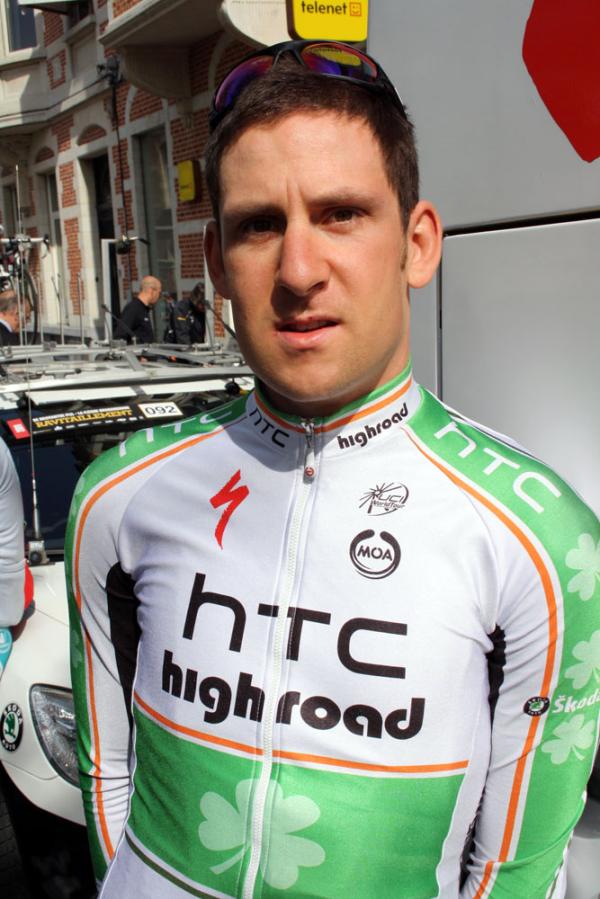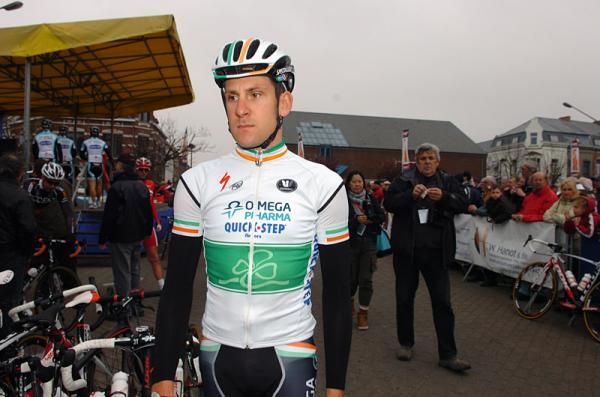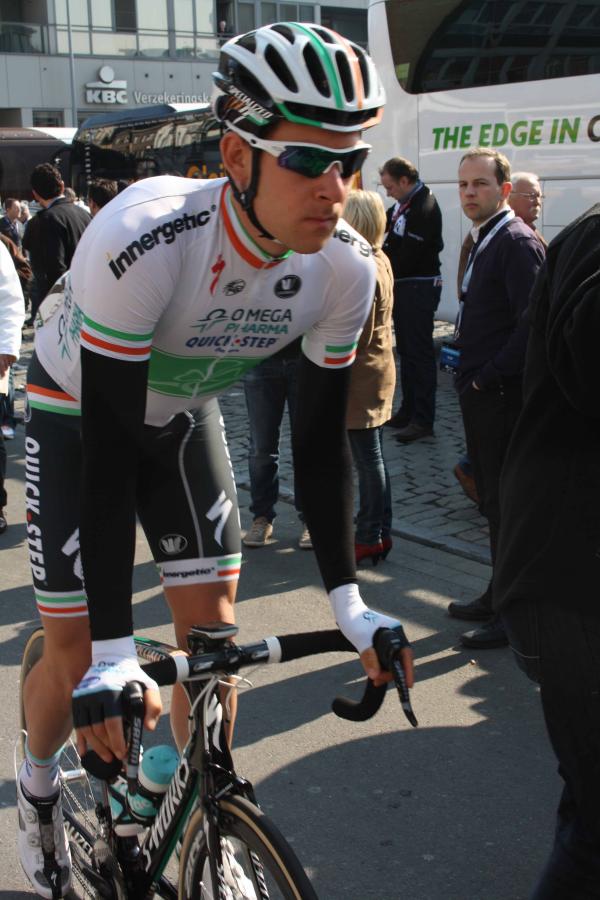Domestiques are an endangered species, warns Brammeier
Irish champion on WorldTour points and leaving Omega Pharma-QuickStep



Cycling can be a cruel business, as Matt Brammeier discovered in mid-September. Scanning the morning newspapers, the Irish champion came across an article outlining Omega Pharma-QuickStep’s plans for 2013, only to read that his services would not be retained for the new season.
Brammeier joins Omega Pharma-Quickstep for 2012, Seeldraeyers to Astana
Brammeier among familiar faces at Omega Pharma-Quick Step
Brammeier takes third consecutive Irish title
UCI WorldTour has revitalized cycling, says coordinator
Riders' Association calls for establishment of independent anti-doping commission
Brammeier signs with Champion System
Brammeier makes aggressive start to classics campaign
Brammeier Irish Champion for a record fourth straight year
Meier extends stay at Orica-GreenEdge
Brammeier still without a contract for 2014
“Yeah, I actually found out by reading it in the newspaper,” Brammeier told Cyclingnews. “Nobody contacted me directly so that was a bit of a disappointment. I just read a piece saying that they probably wouldn’t be re-signing me next year.”
Brammeier joined Omega Pharma in the wake of the demise of HTC-Highroad at the end of last year, part of a sizable enclave of his erstwhile teammates and sports directors who found a home at Patrick Lefevere’s outfit. Once the initial optimism died down, however, it soon became apparent that the philosophies of the two squads were somewhat different.
“I didn’t have a super year there really. I didn’t really feel at home. It just didn’t seem like a team to me,” said Brammeier. “I wanted to stick with the guys from HTC because it was a little bit more familiar than going into a totally different team and starting again. I was pretty happy to be around Brian Holm and people like that.
“But looking back on it, I don’t really feel like the team wanted me as an individual. It was more that I was taken along as part of a package. I think that was a mistake I made really. I had a few really good offers last year and I could have gone to another big team and worked on something there.”
Already scheduled to undergo routine knee surgery at the end of the campaign, Brammeier’s off-season was complicated still further by the news, although he is hopeful that he will be able to confirm his destination for 2013 in the coming weeks.
“At the moment I haven’t decided anything,” he said. “There are still a few options but it’s getting pretty late so I think I need to get my arse into gear and get things sorted. It’s not entirely what I had hoped for but I’m happy enough with the position I’m in at the minute.
The latest race content, interviews, features, reviews and expert buying guides, direct to your inbox!
“There’s still a good chance of being in the WorldTour, although now with the WorldTour rankings I think we need to wait a few more days for all that to be decided before I know what’s going to happen.”
While Brammeier waits to confirm his 2013 team, the 27-year-old has already begun his preparations for the new season and has been back on the bike for ten days. “The knee is all fixed, so I’ve just been doing some easy riding to build the strength back up,” he said. “I’m not too stressed at the minute. Everything’s going to plan.”
WorldTour points
As had been the case at HTC-Highroad, Brammeier threw himself wholeheartedly into riding in support of his leaders from the beginning of the campaign. “I’m quite happy to be in a bigger team and do a job for other people,” he explained. “I’d be happy to do that for that rest of my career if I could.”
But while the figure of the domestique is an intrinsic part of the very fabric of cycling’s history, it is a vocation under increasing threat in the current era due to the demands of the UCI WorldTour system. Brammeier ended his stint at Omega Pharma-QuickStep without any WorldTour points from 2012, and in the existing transfer market, they are a far more valuable commodity than potential or the ability to ride selflessly for a leader.
“I accept that there has to be some kind of ranking system to work out which teams are going to be in the top tier, but guys like me are kind of screwed,” Brammeier said. “I probably get to race for myself less than 10 percent of the time over the whole year, and a lot of those times I don’t even know beforehand, it just kind of happens, so it’s hard to take those chances when they come.
“Then you get to the end of the year after doing your job for the team and you have no points – what do you do then? You try to find a new team, but nowadays, every director you talk to, the first question they ask is, ‘how many points have you got?’”
Brammeier echoed a suggestion made by Geoffroy Lequatre to Cyclingnews last year, namely that, just as prize money is traditionally divided among teammates, domestiques should also get a share of their leader’s UCI points. “I think if a rider wins a race, then everybody on his team who rode that race should get something from it. Otherwise it totally devalues riders like myself and eventually, domestiques are just not going to be around anymore.”
It is already apparent that at the tail end of the season, many feel obliged to defy team orders and ride more selfishly in a bid to secure points and a new contract. “On every team, you can tell which guys have a contract on that team for next year and which guys don’t, it’s obvious,” Brammeier said, citing the example of a teammate who sat at the rear of the bunch on stage 1 of the Tour of Utah to protect his own interests rather than infiltrate the early break as instructed by the team.
“That’s the kind of guy I don’t want to be. It’s something that I didn’t want to stoop to, and I didn’t want to let the guys down. All season, I hoped that people would see the sacrifices that I made and respect me for being the kind of rider who gives everything for the team. I think cycling needs that and teams need that. That’s kind of how I’ve tried to sell myself, but with this new points system, it doesn’t really work like that anymore.”
Brammeier is skeptical, however, about the notion championed in some quarters that the current WorldTour system somehow gives riders in search of a contract an incentive to dope in order to secure their futures. “I don’t think you can use that as an excuse,” he said. “I don’t think something like that is going to sway you to do it. If you’re the kind of guy who’s going to stick something in your body, you’re going to do it anyway.”
Olympics
Points systems would prove to be the bane of Brammeier’s life in 2012. In spite of taking a third consecutive national road race title with a fine victory in Clonmel in June, the 27-year-old was controversially left out of the Irish team for the Olympic Games, due to Cycling Ireland’s insistence on basing the selection process on a convoluted points system.
Dan Martin, Nicolas Roche and David McCann got the nod for London, and after a late appeal to the Olympic Council of Ireland failed, Brammeier watched in frustration as the sizable winning move went clear on Box Hill without an Irish presence.
“I think it’s a stupid system and Cycling Ireland needs to change it,” he said. “You can’t use a mathematical equation to select a team. You need to have a team manager with a set of balls who stands up and says, ‘This is the team that I want to go, this the best team we can select to get the best result, and if you don’t like it, then tough.’
“But this is a bit of a drawback to doing what I do, which is helping other guys win races, so maybe it’s something I just have to live with.”

Barry Ryan was Head of Features at Cyclingnews. He has covered professional cycling since 2010, reporting from the Tour de France, Giro d’Italia and events from Argentina to Japan. His writing has appeared in The Independent, Procycling and Cycling Plus. He is the author of The Ascent: Sean Kelly, Stephen Roche and the Rise of Irish Cycling’s Golden Generation, published by Gill Books.